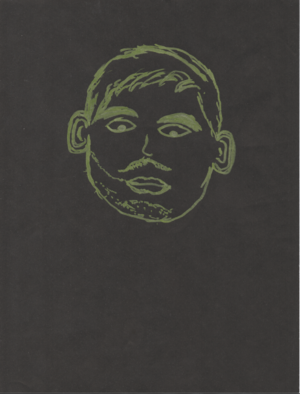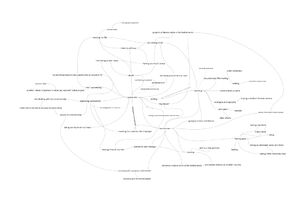User:Llujan: Difference between revisions
(→2) |
No edit summary |
||
| (47 intermediate revisions by the same user not shown) | |||
| Line 1: | Line 1: | ||
== | = Luis Luján = | ||
=== | /lwɪs loo-HAHN/ 🇲🇽 | ||
[[File:Luis by Cesar.png|thumb|Luis portrait by Cesar]] | |||
== Graduate Seminar == | |||
[[Luis Luján - Thesis outline]] | |||
== Reading, Writing & Research Methodologies == | |||
[[Luis' Text on Practice 2022]] (third draft, June 2022) | |||
[[Luis Interview - R&R]] | |||
[[What/How/Why - The abandoned house]] | |||
[[Short experimental text on practice]] | |||
[[File:Ex1LL.jpg|thumb|Self portrait exercise]] | [[File:Ex1LL.jpg|thumb|Self portrait exercise]] | ||
== | == Self Reflection == | ||
[[Archive of my own - Archontic analysis of experiences, network and projects | Archontic analysis of concepts, resources and projects ]] | |||
---- | |||
== Reading list == | |||
===== | |||
==== Decolonialidad & migration ==== | |||
Esferas de la insurrección. Apuntes para descolonizar el inconsciente. Suely Rolnik | |||
Migration As Decolonization. Tendayi Achiume | |||
The Figure of the Migrant. Stanford University Press. Thomas Nail. [https://miro.com/app/board/uXjVOCI61Vs=/?invite_link_id=851095751698 Notes.] | |||
[https://www.mondriaanfonds.nl/en/activities/vistas-of-modernity-decolonial-aesthesis-and-the-end-of-the-contemporary/ Vistas of Modernity – decolonial aesthesis and the end of the contemporary]. Rolando Vázquez | |||
==== Ethics & participatory art ==== | |||
A Restless Art: How Participation Won, and why it Matters. François Matarasso | |||
Artificial Hells: Participatory Art and the Politics of Spectatorship. Claire Bishop | |||
[https://mitpress.mit.edu/books/ethics Ethics] - Edited by Walead Beshty | |||
[https://gulbenkian.pt/en/publication/ethics-and-participatory-art/ Ethics and Participatory Art] - Arlene Goldbard, François Matarasso | |||
==== Filmmaking ==== | |||
[https://www.sternberg-press.com/product/critique-in-practice-renzo-martens-episode-iii-enjoy-poverty/ Critique in Practice Renzo Martens‘ “Episode III: Enjoy Poverty] - Anthony Downey (Ed.) | |||
[https://edinburghuniversitypress.com/book-refocus-the-films-of-pedro-costa.html ReFocus: The Films of Pedro Costa: Producing and Consuming Contemporary Art Cinema] - Nuno Barradas Jorge | |||
==== Hauntology & horror genre ==== | |||
Borders and ghosts - Nermin Sayibasili | |||
A glossary of haunting - Eve Tuck and C. Ree | |||
The Philosophy of Horror - Noel Carroll | |||
==== Philosophy ==== | |||
A Weak Messianic Power Figures of a Time to Come in Benjamin, Derrida, and Celan - Michael G. Levine | |||
On the Concept of History - Walter Benjamin | |||
Latest revision as of 20:28, 8 December 2022
Luis Luján
/lwɪs loo-HAHN/ 🇲🇽
Graduate Seminar
Reading, Writing & Research Methodologies
Luis' Text on Practice 2022 (third draft, June 2022)
What/How/Why - The abandoned house
Short experimental text on practice
Self Reflection
Archontic analysis of concepts, resources and projects
Reading list
Decolonialidad & migration
Esferas de la insurrección. Apuntes para descolonizar el inconsciente. Suely Rolnik
Migration As Decolonization. Tendayi Achiume
The Figure of the Migrant. Stanford University Press. Thomas Nail. Notes.
Vistas of Modernity – decolonial aesthesis and the end of the contemporary. Rolando Vázquez
Ethics & participatory art
A Restless Art: How Participation Won, and why it Matters. François Matarasso
Artificial Hells: Participatory Art and the Politics of Spectatorship. Claire Bishop
Ethics - Edited by Walead Beshty
Ethics and Participatory Art - Arlene Goldbard, François Matarasso
Filmmaking
Critique in Practice Renzo Martens‘ “Episode III: Enjoy Poverty - Anthony Downey (Ed.)
ReFocus: The Films of Pedro Costa: Producing and Consuming Contemporary Art Cinema - Nuno Barradas Jorge
Hauntology & horror genre
Borders and ghosts - Nermin Sayibasili
A glossary of haunting - Eve Tuck and C. Ree
The Philosophy of Horror - Noel Carroll
Philosophy
A Weak Messianic Power Figures of a Time to Come in Benjamin, Derrida, and Celan - Michael G. Levine
On the Concept of History - Walter Benjamin


